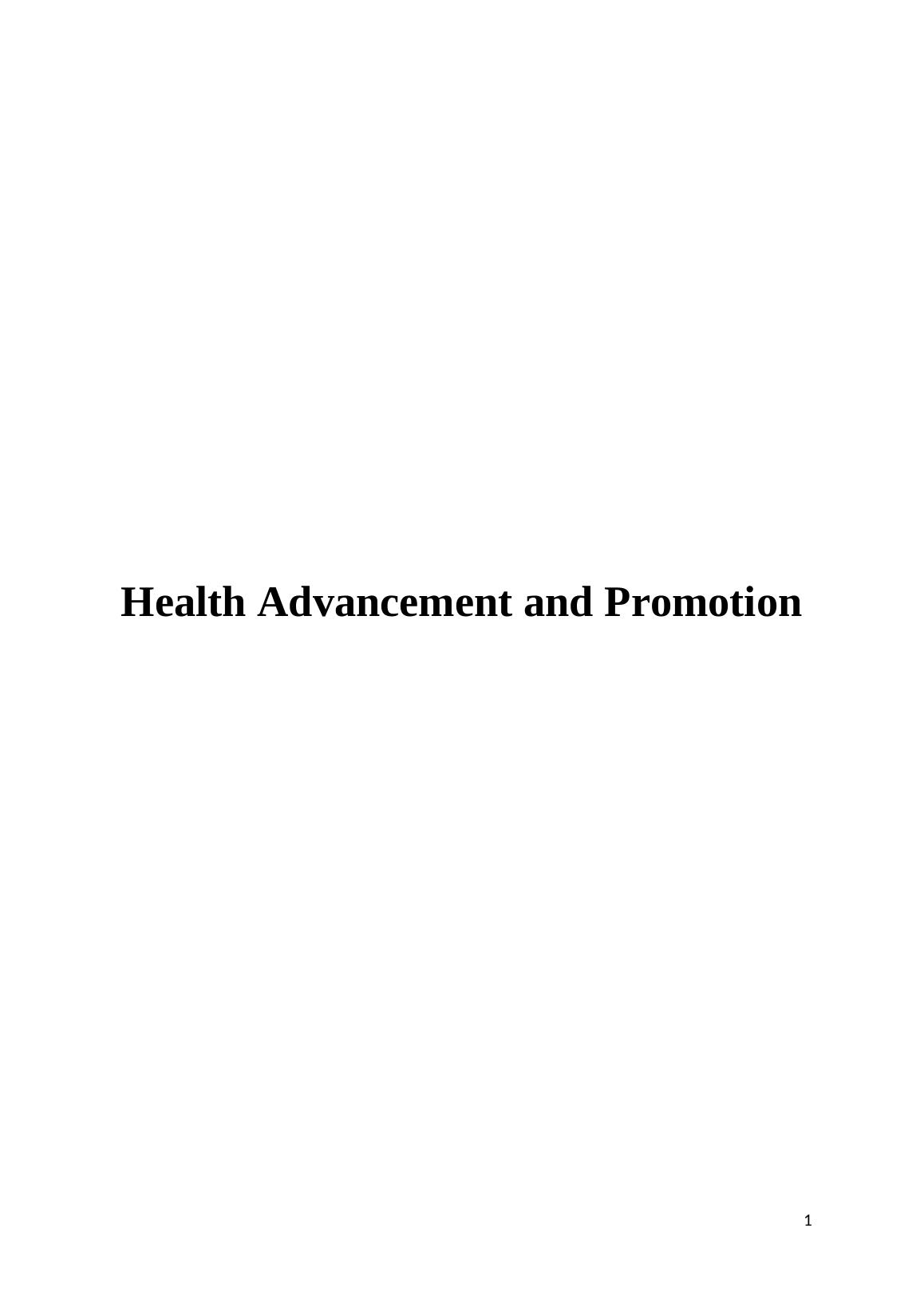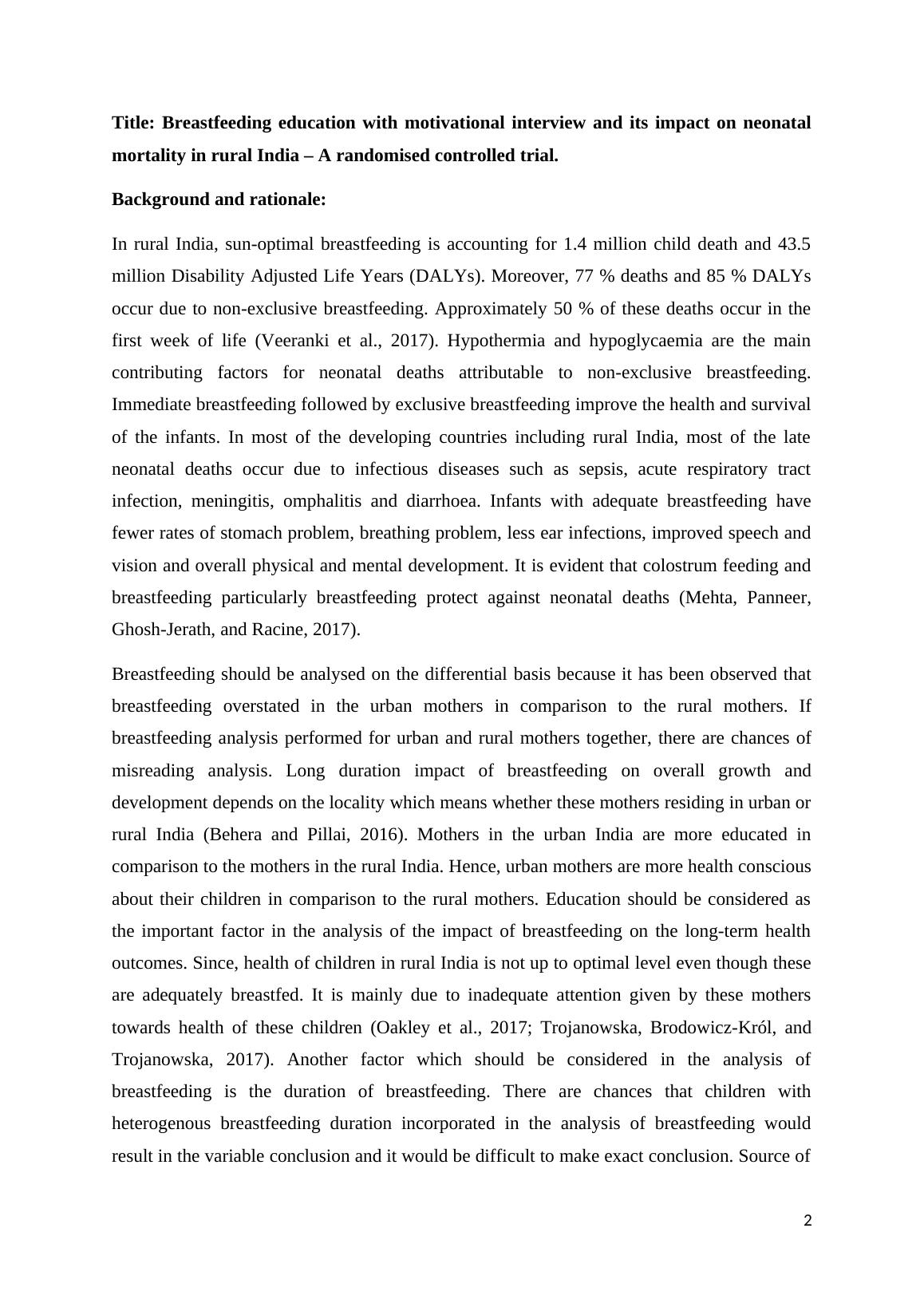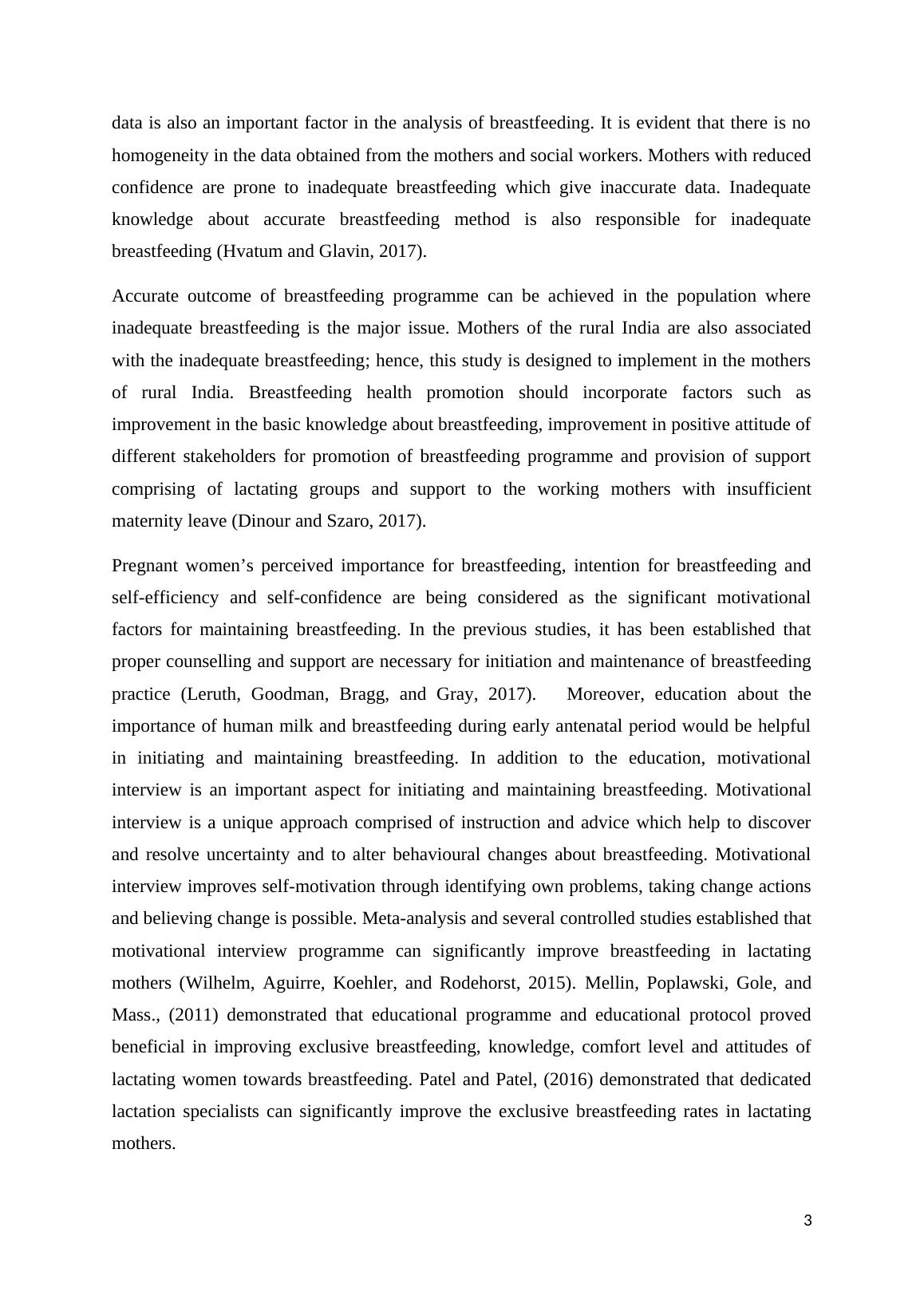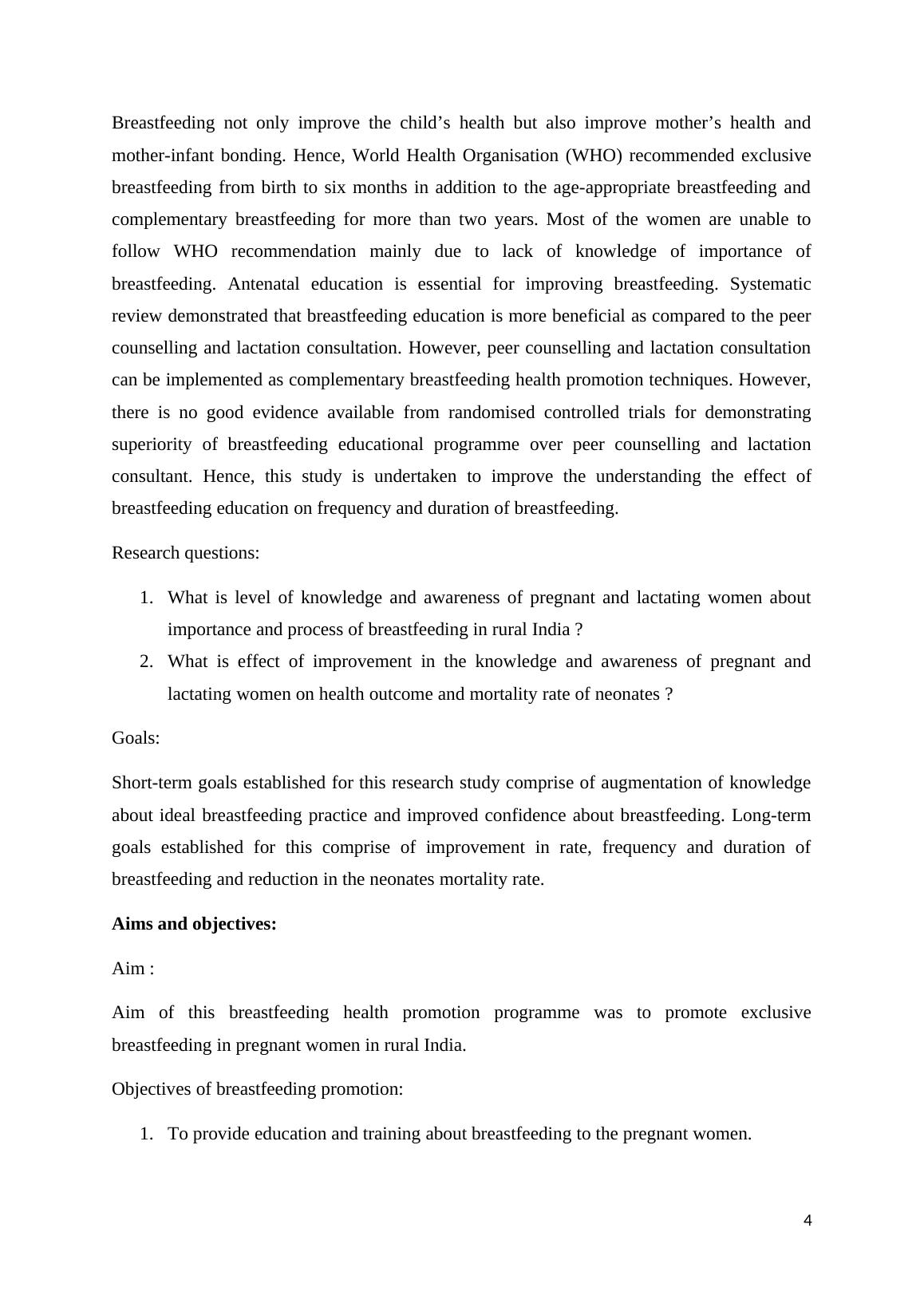Health Advancement and Promotion Analysis 2022
Added on 2022-10-18
17 Pages5464 Words12 Views
Health Advancement and Promotion
1
1

Title: Breastfeeding education with motivational interview and its impact on neonatal
mortality in rural India – A randomised controlled trial.
Background and rationale:
In rural India, sun-optimal breastfeeding is accounting for 1.4 million child death and 43.5
million Disability Adjusted Life Years (DALYs). Moreover, 77 % deaths and 85 % DALYs
occur due to non-exclusive breastfeeding. Approximately 50 % of these deaths occur in the
first week of life (Veeranki et al., 2017). Hypothermia and hypoglycaemia are the main
contributing factors for neonatal deaths attributable to non-exclusive breastfeeding.
Immediate breastfeeding followed by exclusive breastfeeding improve the health and survival
of the infants. In most of the developing countries including rural India, most of the late
neonatal deaths occur due to infectious diseases such as sepsis, acute respiratory tract
infection, meningitis, omphalitis and diarrhoea. Infants with adequate breastfeeding have
fewer rates of stomach problem, breathing problem, less ear infections, improved speech and
vision and overall physical and mental development. It is evident that colostrum feeding and
breastfeeding particularly breastfeeding protect against neonatal deaths (Mehta, Panneer,
Ghosh-Jerath, and Racine, 2017).
Breastfeeding should be analysed on the differential basis because it has been observed that
breastfeeding overstated in the urban mothers in comparison to the rural mothers. If
breastfeeding analysis performed for urban and rural mothers together, there are chances of
misreading analysis. Long duration impact of breastfeeding on overall growth and
development depends on the locality which means whether these mothers residing in urban or
rural India (Behera and Pillai, 2016). Mothers in the urban India are more educated in
comparison to the mothers in the rural India. Hence, urban mothers are more health conscious
about their children in comparison to the rural mothers. Education should be considered as
the important factor in the analysis of the impact of breastfeeding on the long-term health
outcomes. Since, health of children in rural India is not up to optimal level even though these
are adequately breastfed. It is mainly due to inadequate attention given by these mothers
towards health of these children (Oakley et al., 2017; Trojanowska, Brodowicz-Król, and
Trojanowska, 2017). Another factor which should be considered in the analysis of
breastfeeding is the duration of breastfeeding. There are chances that children with
heterogenous breastfeeding duration incorporated in the analysis of breastfeeding would
result in the variable conclusion and it would be difficult to make exact conclusion. Source of
2
mortality in rural India – A randomised controlled trial.
Background and rationale:
In rural India, sun-optimal breastfeeding is accounting for 1.4 million child death and 43.5
million Disability Adjusted Life Years (DALYs). Moreover, 77 % deaths and 85 % DALYs
occur due to non-exclusive breastfeeding. Approximately 50 % of these deaths occur in the
first week of life (Veeranki et al., 2017). Hypothermia and hypoglycaemia are the main
contributing factors for neonatal deaths attributable to non-exclusive breastfeeding.
Immediate breastfeeding followed by exclusive breastfeeding improve the health and survival
of the infants. In most of the developing countries including rural India, most of the late
neonatal deaths occur due to infectious diseases such as sepsis, acute respiratory tract
infection, meningitis, omphalitis and diarrhoea. Infants with adequate breastfeeding have
fewer rates of stomach problem, breathing problem, less ear infections, improved speech and
vision and overall physical and mental development. It is evident that colostrum feeding and
breastfeeding particularly breastfeeding protect against neonatal deaths (Mehta, Panneer,
Ghosh-Jerath, and Racine, 2017).
Breastfeeding should be analysed on the differential basis because it has been observed that
breastfeeding overstated in the urban mothers in comparison to the rural mothers. If
breastfeeding analysis performed for urban and rural mothers together, there are chances of
misreading analysis. Long duration impact of breastfeeding on overall growth and
development depends on the locality which means whether these mothers residing in urban or
rural India (Behera and Pillai, 2016). Mothers in the urban India are more educated in
comparison to the mothers in the rural India. Hence, urban mothers are more health conscious
about their children in comparison to the rural mothers. Education should be considered as
the important factor in the analysis of the impact of breastfeeding on the long-term health
outcomes. Since, health of children in rural India is not up to optimal level even though these
are adequately breastfed. It is mainly due to inadequate attention given by these mothers
towards health of these children (Oakley et al., 2017; Trojanowska, Brodowicz-Król, and
Trojanowska, 2017). Another factor which should be considered in the analysis of
breastfeeding is the duration of breastfeeding. There are chances that children with
heterogenous breastfeeding duration incorporated in the analysis of breastfeeding would
result in the variable conclusion and it would be difficult to make exact conclusion. Source of
2

data is also an important factor in the analysis of breastfeeding. It is evident that there is no
homogeneity in the data obtained from the mothers and social workers. Mothers with reduced
confidence are prone to inadequate breastfeeding which give inaccurate data. Inadequate
knowledge about accurate breastfeeding method is also responsible for inadequate
breastfeeding (Hvatum and Glavin, 2017).
Accurate outcome of breastfeeding programme can be achieved in the population where
inadequate breastfeeding is the major issue. Mothers of the rural India are also associated
with the inadequate breastfeeding; hence, this study is designed to implement in the mothers
of rural India. Breastfeeding health promotion should incorporate factors such as
improvement in the basic knowledge about breastfeeding, improvement in positive attitude of
different stakeholders for promotion of breastfeeding programme and provision of support
comprising of lactating groups and support to the working mothers with insufficient
maternity leave (Dinour and Szaro, 2017).
Pregnant women’s perceived importance for breastfeeding, intention for breastfeeding and
self-efficiency and self-confidence are being considered as the significant motivational
factors for maintaining breastfeeding. In the previous studies, it has been established that
proper counselling and support are necessary for initiation and maintenance of breastfeeding
practice (Leruth, Goodman, Bragg, and Gray, 2017). Moreover, education about the
importance of human milk and breastfeeding during early antenatal period would be helpful
in initiating and maintaining breastfeeding. In addition to the education, motivational
interview is an important aspect for initiating and maintaining breastfeeding. Motivational
interview is a unique approach comprised of instruction and advice which help to discover
and resolve uncertainty and to alter behavioural changes about breastfeeding. Motivational
interview improves self-motivation through identifying own problems, taking change actions
and believing change is possible. Meta-analysis and several controlled studies established that
motivational interview programme can significantly improve breastfeeding in lactating
mothers (Wilhelm, Aguirre, Koehler, and Rodehorst, 2015). Mellin, Poplawski, Gole, and
Mass., (2011) demonstrated that educational programme and educational protocol proved
beneficial in improving exclusive breastfeeding, knowledge, comfort level and attitudes of
lactating women towards breastfeeding. Patel and Patel, (2016) demonstrated that dedicated
lactation specialists can significantly improve the exclusive breastfeeding rates in lactating
mothers.
3
homogeneity in the data obtained from the mothers and social workers. Mothers with reduced
confidence are prone to inadequate breastfeeding which give inaccurate data. Inadequate
knowledge about accurate breastfeeding method is also responsible for inadequate
breastfeeding (Hvatum and Glavin, 2017).
Accurate outcome of breastfeeding programme can be achieved in the population where
inadequate breastfeeding is the major issue. Mothers of the rural India are also associated
with the inadequate breastfeeding; hence, this study is designed to implement in the mothers
of rural India. Breastfeeding health promotion should incorporate factors such as
improvement in the basic knowledge about breastfeeding, improvement in positive attitude of
different stakeholders for promotion of breastfeeding programme and provision of support
comprising of lactating groups and support to the working mothers with insufficient
maternity leave (Dinour and Szaro, 2017).
Pregnant women’s perceived importance for breastfeeding, intention for breastfeeding and
self-efficiency and self-confidence are being considered as the significant motivational
factors for maintaining breastfeeding. In the previous studies, it has been established that
proper counselling and support are necessary for initiation and maintenance of breastfeeding
practice (Leruth, Goodman, Bragg, and Gray, 2017). Moreover, education about the
importance of human milk and breastfeeding during early antenatal period would be helpful
in initiating and maintaining breastfeeding. In addition to the education, motivational
interview is an important aspect for initiating and maintaining breastfeeding. Motivational
interview is a unique approach comprised of instruction and advice which help to discover
and resolve uncertainty and to alter behavioural changes about breastfeeding. Motivational
interview improves self-motivation through identifying own problems, taking change actions
and believing change is possible. Meta-analysis and several controlled studies established that
motivational interview programme can significantly improve breastfeeding in lactating
mothers (Wilhelm, Aguirre, Koehler, and Rodehorst, 2015). Mellin, Poplawski, Gole, and
Mass., (2011) demonstrated that educational programme and educational protocol proved
beneficial in improving exclusive breastfeeding, knowledge, comfort level and attitudes of
lactating women towards breastfeeding. Patel and Patel, (2016) demonstrated that dedicated
lactation specialists can significantly improve the exclusive breastfeeding rates in lactating
mothers.
3

Breastfeeding not only improve the child’s health but also improve mother’s health and
mother-infant bonding. Hence, World Health Organisation (WHO) recommended exclusive
breastfeeding from birth to six months in addition to the age-appropriate breastfeeding and
complementary breastfeeding for more than two years. Most of the women are unable to
follow WHO recommendation mainly due to lack of knowledge of importance of
breastfeeding. Antenatal education is essential for improving breastfeeding. Systematic
review demonstrated that breastfeeding education is more beneficial as compared to the peer
counselling and lactation consultation. However, peer counselling and lactation consultation
can be implemented as complementary breastfeeding health promotion techniques. However,
there is no good evidence available from randomised controlled trials for demonstrating
superiority of breastfeeding educational programme over peer counselling and lactation
consultant. Hence, this study is undertaken to improve the understanding the effect of
breastfeeding education on frequency and duration of breastfeeding.
Research questions:
1. What is level of knowledge and awareness of pregnant and lactating women about
importance and process of breastfeeding in rural India ?
2. What is effect of improvement in the knowledge and awareness of pregnant and
lactating women on health outcome and mortality rate of neonates ?
Goals:
Short-term goals established for this research study comprise of augmentation of knowledge
about ideal breastfeeding practice and improved confidence about breastfeeding. Long-term
goals established for this comprise of improvement in rate, frequency and duration of
breastfeeding and reduction in the neonates mortality rate.
Aims and objectives:
Aim :
Aim of this breastfeeding health promotion programme was to promote exclusive
breastfeeding in pregnant women in rural India.
Objectives of breastfeeding promotion:
1. To provide education and training about breastfeeding to the pregnant women.
4
mother-infant bonding. Hence, World Health Organisation (WHO) recommended exclusive
breastfeeding from birth to six months in addition to the age-appropriate breastfeeding and
complementary breastfeeding for more than two years. Most of the women are unable to
follow WHO recommendation mainly due to lack of knowledge of importance of
breastfeeding. Antenatal education is essential for improving breastfeeding. Systematic
review demonstrated that breastfeeding education is more beneficial as compared to the peer
counselling and lactation consultation. However, peer counselling and lactation consultation
can be implemented as complementary breastfeeding health promotion techniques. However,
there is no good evidence available from randomised controlled trials for demonstrating
superiority of breastfeeding educational programme over peer counselling and lactation
consultant. Hence, this study is undertaken to improve the understanding the effect of
breastfeeding education on frequency and duration of breastfeeding.
Research questions:
1. What is level of knowledge and awareness of pregnant and lactating women about
importance and process of breastfeeding in rural India ?
2. What is effect of improvement in the knowledge and awareness of pregnant and
lactating women on health outcome and mortality rate of neonates ?
Goals:
Short-term goals established for this research study comprise of augmentation of knowledge
about ideal breastfeeding practice and improved confidence about breastfeeding. Long-term
goals established for this comprise of improvement in rate, frequency and duration of
breastfeeding and reduction in the neonates mortality rate.
Aims and objectives:
Aim :
Aim of this breastfeeding health promotion programme was to promote exclusive
breastfeeding in pregnant women in rural India.
Objectives of breastfeeding promotion:
1. To provide education and training about breastfeeding to the pregnant women.
4

End of preview
Want to access all the pages? Upload your documents or become a member.
Related Documents
Infant and young child feeding education and its impact on infant mortality in rural Nepallg...
|12
|3565
|74
Policy, Power and Politics in Healthcarelg...
|14
|4487
|143
Health Advancement and Promotion Assignment | Breastfeeding Reportlg...
|9
|2365
|64
Breastfeeding Policy in Australialg...
|18
|4562
|81
